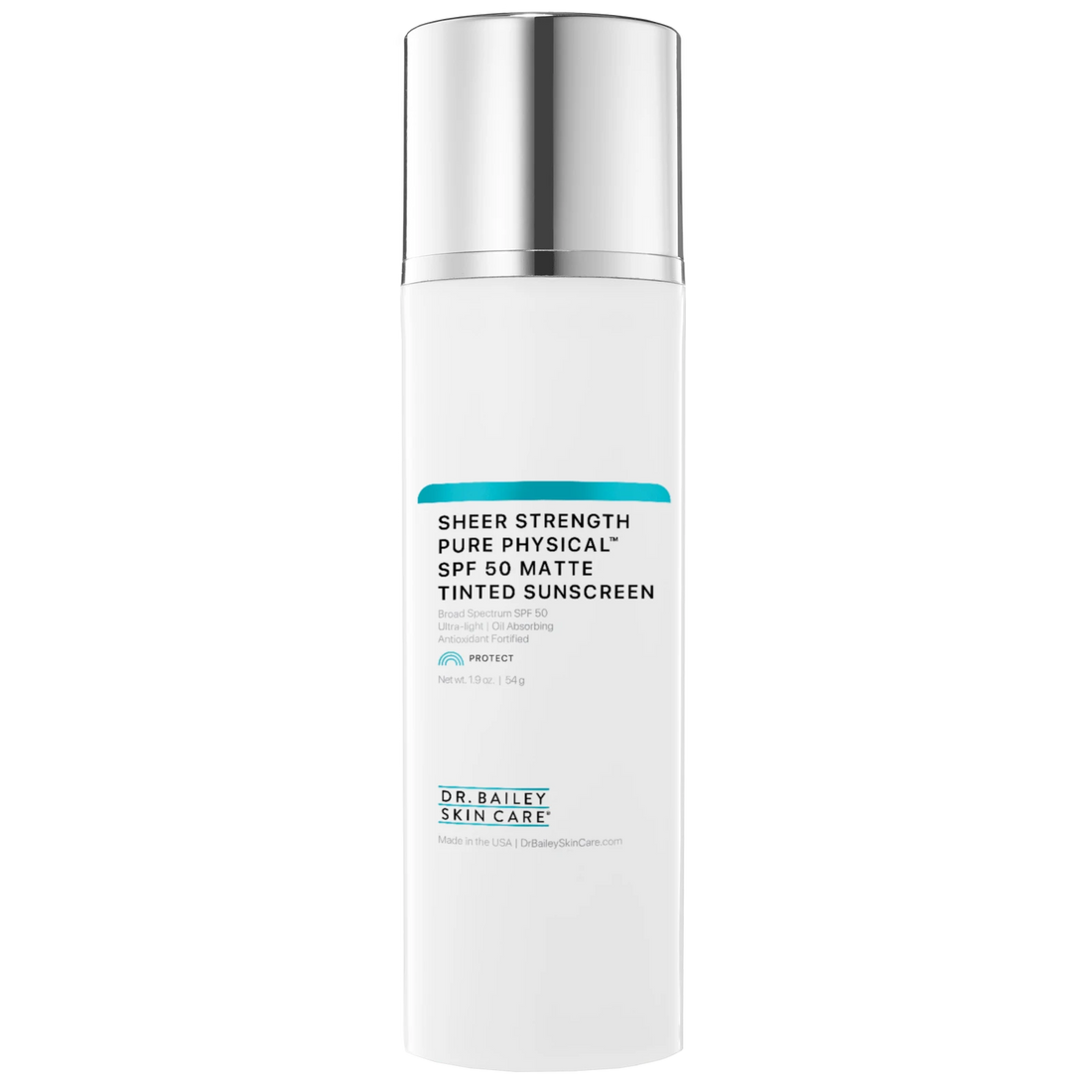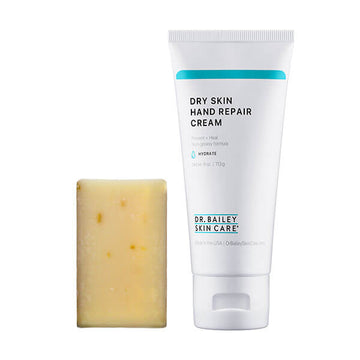‘I’m A Dermatologist With Eczema, Here’s My Skin Care Routine to Keep My Skin Clear’

I am a dermatologist who depends on my own eczema skin care routine to keep my skin comfortable, clear and eczema-free. I have eczema. I knew as a kid that I had dry sensitive skin and I've experienced many times in my life how easily my skin becomes tight, itchy and broken out with one type of eczema or another. As a dermatologist, I also know what is going on inside sensitive skin and how to prevent and control eczema. The trick it to take the time and mindfully create an eczema healing skin care routine and then stick to it.

For over 35+ years, I’ve helped many people with their skin problems daily, including eczema and sensitive skin. Yet, I’m often the last person to get my own attention.
Sometimes I get my best personal advice when I actually listen to myself explaining a skin problem to a patient.
This was how I figured out my allergic eczematous dermatitis to citrus. I was treating a woman for this on her lips. She had been squeezing lemon in her tea and her upper and lower lip skin was cracked, red and stung. The allergic dermatitis looked and felt like chapped lips - just like mine! All of a sudden, I realized that my chronically chapped lips were caused by the same allergy to citrus and I too had been squeezing lemons from my tree in my water glass every day for years!
This was a wakeup call and I started giving myself my own focused expertise including mindfully creating a skin care routine to control the several types of eczema that suffer from.
How many people have eczema?
Overall, eczema is relatively common with at least 17% of people having some sort of eczema. The most well-known type of eczema is atopic dermatitis which is typically an inherited condition where skin is dry, hypersensitive and linked to asthma, hay fever and food allergies. The combination of these conditions is called an atopic diathesis. I have this and we are the classic 'sensitive skin' people.
Throughout my life I’ve battled with my atopic skin including:
- keratosis pilaris (chicken skin bumps behind my arms and on my thighs)
- dry skin prone to dry skin eczema and severely chapped hands
- allergic reactions to citrus, fragrance, adhesive, wool and jewelry (nickel)
- seborrheic dermatitis type of eczema (more common in atopics)
There is also a phenomenon called the "atopic march" that you need to know about if you have eczema.
This is the phenomenon where over time we become allergic to more things if we expose ourselves to allergens - like fragrance, citrus etc. Over the course of life, the more allergens your body is exposed to the more allergies and sensitivities you develop. This "atopic march” applies to your skin care routine and personal lifestyle; your skin care routine and personal care choices need to be hypoallergenic if you are prone to eczema.
As a small girl I thought the rough bumps and scaly skin on my arms, legs and sides were normal until, in adolescence, I started using a moisturizing cream after my shower. Amazingly, my skin became softer and much less rough. At the age of 12, I realized skin care could change my skin. - Dermatologist Dr. Cynthia Bailey
6 skin care and lifestyle modifications for sensitive, dry eczema-prone skin:
-
Opt for products labeled for “sensitive-skin” including creams, soaps, hand cleansers, detergents etc.
-
Wear soft breathable clothing such as cotton, some synthetics and cashmere (oh darn!).
-
Be careful with jewelry metal; 18K gold and platinum are less likely to cause metal allergy (again, oh darn!).
-
Use “hydrating gentle skin care” from head to toe meaning only gentle soaps and cleansers, avoid hot water temperature for skin cleansing and always moisturize skin within the magic 3 minutes after patting skin dry with a towel.
-
Use a gentle hand cleanser and apply a hand cream several times a day after washing.
-
Use an AHA lotion, when eczema is not active, to keep arm and leg skin smooth and free from KP and to enhance skin barrier integrity.
Dermatologist Dr. Bailey’s eczema skin care routine personal products for eczema:
Keep the cleanser simple for both face and body.
I bath or shower with my Naturally Best Bar Soap that is fragrance free and entirely hypoallergenic. This soap is in every shower and at every sink in my home. When I bathe, I only soap up soiled or body-odor prone areas of the armpits, groin, buttock and feet.
I wash my face with my Extremely Gentle Foaming Facial Cleanser. I double cleanse with my Naturally Hydrating Pore Minimizing Toner. I put them together in my Skin Cleanse Zen kit.
People with extremely eczema-prone skin may need to use skin cleansing products that are even more gentle such as VaniCream Bar Soap for face and body cleansing. It is a very safe alternative but not nearly as lovely as my personal cleansing skin care routine in my opinion. I'm grateful my skin cuts me a little slack here.
I swear by green tea antioxidants to control redness and facial eczema from seborrhea.
Green Tea Antioxidant Skin Therapy tipped the balance for my rosacea and seborrhea (yes, I have rosacea too) – taking my skin from a struggle to Zen. I never let myself run out. It also allows me to use retinoids and glycolic acid – the best age fighting ingredients we have in skin care. I apply green tea antioxidants to my face twice a day.
Lipid rich moisturizers help heal and support the skin barrier in eczema.
I know that applying a really good moisturizer to eczema-prone skin is critically important to hydrate skin and help hold water throughout the skin layers. Lipids in a moisturizer also replenish lost lipids in the skin barrier. Both elements are important to help weakened eczema-prone skin resist transepidermal water loss (a problem for eczema-prone skin). I use moisturizers with ceramides and skin-friendly botanical oils.
During the day I wear a light-weight ceramide rich moisturizer under sunscreen.
Ceramides are important skin lipids and ideal to support skin barrier. My Daily Moisturizing Face Cream is rich in the right ceramides plus squalane to help maintain healthy facial skin. I wear it every day under my sunscreen.
I use a botanical face oil at night.
I always top my anti-aging night routine with my Omega Enriched Oil. I apply a few drops in my palm, pat my palms together then pat my face with the oil. On the rare night when I’m giving my skin a rest from anti-aging products, I apply my Daily Face Cream boosted with a few drops of my Omega Oil. My dry, sensitive skin loves the botanic oil formulation of my Omega Enriched Face Booster Oil.
I actually made my Omega Enriched Face Oil for my dear Australian friend Lorraine who has similar skin to mine. It’s been so popular with my sensitive skin patients that I decided to make it available to everyone. I blended organic kukui, rosehip, pomegranate, argan and other oils with borage and sea buckthorn – key ingredients to heal and support sensitive skin barrier.
Mineral oil and petrolatum, both time-honored dermatologic moisturizing ingredients, also work well as a heavy moisturizer for eczema-prone skin. But they lack the other attributes of botanical oils such as fatty acids that mimic skin lipids, antioxidants and vitamins known to benefit skin health. I prefer hypoallergenic eczema-friendly botanical oils.
I only trust zinc oxide sunscreen and I wear it 365 days a year.
Every day I apply one of my Sheer Strength Pure Physical™ Sunscreens with zinc oxide . My skin will not tolerate chemical sunscreen ingredients and I avoid them like the plague. Chemical sunscreen intolerance is normal for someone with sensitive skin such as me. Plus, over my 35+ year career, I’ve done well over 200,000 skin exams on active Californians, allowing me to compare the protection of different sunscreens. Zinc oxide products clearly give the best protection, there is no question when you look at people’s skin under magnification all day. I only trust my skin to zinc oxide.
I wear my Matte Tinted SPF 50 on my face every day. I apply my Physical Invisible Sunscreen, SPF 50 (also invisible, non-greasy, fabric-friendly and weightless) on all other exposed skin such as my neck, chest, back of my hands etc. When swimming, I wear my Physical Water Resistant Spray Sunscreen, SPF 50. These are all hypoallergenic and free of chemical UV filter ingredients meaning they are ideal for eczema-prone skin.
I rely on hypoallergenic pharmaceutical-grade skin care products for my anti-aging facial skin care.
As a dermatologist, I know the value of using a good anti-aging skin care routine. I started in my late 20s during my dermatology residency and now I'm 62 years old! Time flies and for an old tanning-addicted blond California teen, I know my skin care routine has taken years off my skin aging curve. I depend on retinoids, professional AHA glycolic acid creams, green tea antioxidants and hyaluronic acid to fight the appearance of facial skin aging. Having eczema-prone skin makes anti-aging skin care is tricky and I've worked out the kinks for my complexion.

Can people with eczema use an anti-aging skin care routine?
Yes, I am a dermatologist who does, but it's tricky and you have to select anti-aging products carefully when you are prone to eczema. Supporting skin barrier integrity with your skin care routine becomes even more important if you want to use retinoids and AHAs on eczema prone skin. Your routine and lifestyle must also fight inflammation if you are going to try to tolerate these powerful age fighting ingredients.
To fight collagen loss, I use retinoids and the AHA glycolic acid on my eczema-prone skin.
Retinoids are applied at night. This included retinol or prescription tretinoin, the two best retinoids for countering aging skin. Retinol is less irritating and I use it more often than tretinoin. I apply Retinol Ultra Intensive Anti-Wrinkle Night Cream and top it with either Glycolic Acid Anti-Wrinkle Face Cream (when my skin has no signs of irritation) or Daily Face Cream boosted with Omega Enriched Face Oil.
Both of these products are fragrance free and hypoallergenic. Retinol is easier to tolerate because glycolic acid products need to have acid pH and over 10% concentration to work and this can make them irritating to barrier compromised complexions like those struggling with eczema. Also, Retinol Night Cream includes the high concentration green tea antioxidants so I don't need to apply my Green Tea Antioxidant Therapy at night when I use the Retinol (it's a two-fer!).
Vitamin C is another good age fighting skin care ingredient. Like glycolic acid, it has an acid pH, making it difficult to tolerate. My opinion is that retinoids and glycolic acid are better age fighting ingredients and I focus on those. It also does not mix well with other ingredients and often must be applied alone.
One good trick that I use with Vitamin C is to just use it twice a week. This works because the concentration in skin is only reduced by half over 4 days. I figure that twice a week is sufficient to elevate the skin concentration of this antioxidant sufficiently to get some of its benefits. If you want to use vitamin C, be careful to avoid products that contain citrus or fragrance because many of them do.
Further Your Knowledge
- Using Glycolic Acid and Retinol or Tretinoin (Retin A) for Anti-Aging
- Glycolic Acid is the Best AHA for Smooth, Hydrated Body Skin
- Retinol, Retin A & Tretinoin for Rosacea: Best Anti-Aging Treatment
To plump up my aging crepey skin I use a fractionated hyaluronic acid serum in the morning.
My eczema-prone skin loves hyaluronic acid. Barrier challenged skin benefits from all the help it can get holding water. Hyaluronic acid binds up to 1000 times its weight in water. Fractionated hyaluronic acid allows water to stratify in all the top layers of the skin and also seals it on the skin surface. My Instantly Luminous Serum is formulated with this fractionated hyaluronic acid plus glycerin and sodium PCA (also water binders).
I exfoliate for instantly glowing skin.
Recently, I’ve been able to use my Triple Action Exfoliating Cleanser several times a week because its formulation hits the mark for sensitive skin while also providing me a successful option for skin brightening. Only when eczema-prone skin is really controlled is this possible.
What is the best makeup to use if you have eczema?
Mineral makeup powder is the most hypoallergenic makeup option and best for eczema. When I wear makeup, I use only pure mineral powder; I think powder is a better choice for eczema than liquid makeups because powders don't need preservatives and they typically don't contain fragrance.
I live on hypoallergenic lip care products all day.
I use my Natural Lip Balm many times a day and every night to keep my delicate lip skin from becoming dry. I am careful to never buy lipstick or gloss with allergens like citrus - start looking, many brands include citrus!
My dermatologist eczema skin care routine to keep my body and hand skin hydrated.
I apply my Natural Lotion after every bath or shower. I never skip this because if I do, my skin starts feeling dry. These are both botanical formulations, made with organic ingredients, fragrance-free and no notorious allergens or irritants. They are hypoallergenic, appropriate for the entire family and anyone with sensitive skin.
I use a body skin care routine to fight keratosis pilaris and crusty seborrheic keratosis age spots.
I keep my body skin soft and hydrated with my Ultra-Fast Triple Action Body Smoothing Kit, which I use twice a week. All other days I use either my Natural Lotion or Butter - depending on what's on my bathroom counter when I step out of the shower.
Exfoliation and the strong AHA glycolic acid lotion controls my keratosis pilaris and has prevented me from growing crusty age spots that run in my family (seborrheic keratosis). Both my parents were covered with them by the time they were my age (62 years young).
I give my hands daily TLC to prevent chapping.
My hands get dry and chapped fast like any person's who is prone to eczema. That's because we have a fragile skin barrier and hand washing is hard on skin. To prevent chapping and hand eczema, I wash my hands and apply skin cream designed to be gentle on hand skin:
- I wash with my Naturally Best Bar Soap for all skin types, which is non-drying and easy rinse. I am careful to rinse well between fingers and under rings.
- I apply my Dry Skin Hand Cream, created with water loving glycerin and barrier protecting dimethicone in a no-slippery-grip formulation. I can’t live without this cream and still do dishes, wash my hands at the office over and over, or garden on the weekend.
Both of these products come in my Survival Kit for Busy Hands
What's the bottom line with my personal skin care routine for eczema?
You’ll notice that my products sound custom designed for someone with dry sensitive eczema-prone skin - like me. You’re right! I, like my patients and so many others, need exactly this mindful level of skin care.
I am a dermatologist who knows sensitive skin from the inside out. Add to that my 35+ years caring for people with the same problem but unique product preferences and lifestyles and I've had a lot of experience solving sensitive skin problems. Dry sensitive skin is common - over 60-70% of women and 50-60% of men have it - this is skin care for us!
References
Hanifin JM, Reed ML; Eczema Prevalence and Impact Working Group. A population-based survey of eczema prevalence in the United States. Dermatitis. 2007 Jun;18(2):82-91. doi: 10.2310/6620.2007.06034. PMID: 17498413. https://pubmed.ncbi.nlm.nih.gov/17498413/
Thomsen SF. Epidemiology and natural history of atopic diseases. Eur Clin Respir J. 2015;2:10.3402/ecrj.v2.24642. Published 2015 Mar 24. doi:10.3402/ecrj.v2.24642
Farage MA. The Prevalence of Sensitive Skin. Front Med (Lausanne). 2019;6:98. Published 2019 May 17. doi:10.3389/fmed.2019.00098














